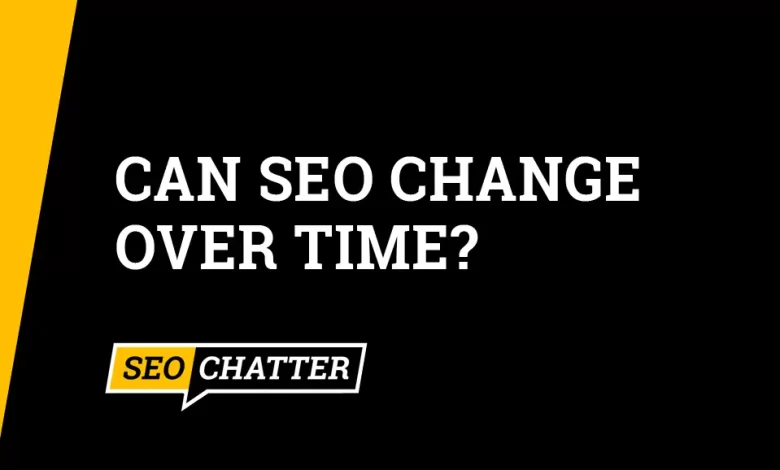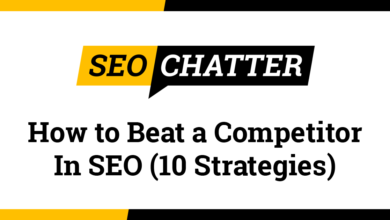Can SEO Change Over Time? (If So, How)-SEO

SEO, or search engine optimization, is the process of improving your website’s visibility and relevance on search engines, such as Google and Bing. SEO can help your web pages rank higher for keywords and phrases that your target audience is searching for, and drive more organic traffic to your website.
But can SEO change over time?
Or is SEO is a static or one-time thing that you can optimize once for and then forget about for the future?
In this article, we will explain if SEO can change over time, and if so, how has SEO changed based to adapt to new technologies, user behaviors, and search engine algorithms.
Can SEO Change Over Time?
SEO can change over time and Google is always adapting and changing its algorithm to rank websites. As a result, SEO methods change over time and you need to stay up to date with the latest best practices and trends in the industry.
How SEO Has Changed Over Time
1. The Change of SEO With RankBrain
Rankbrain was launched in October 2015 and has since then risen to be the third most important ranking signal for SEO on Google Search.
RankBrain is Google’s machine learning system that helps Google understand the context and meaning of search queries and content. RankBrain can also adjust the ranking factors and weights based on the user’s location, device, language, and other signals.
RankBrain has changed SEO by making it more complex and dynamic, as the algorithm can interpret the nuances and subtleties of search queries and content, and provide more personalized and relevant results to users. RankBrain can also change SEO over time by making it more challenging and competitive, as it can rank websites based on hundreds of factors that may vary for each query.
RankBrain can help you improve your SEO by:
- Using natural language processing (NLP) to understand the context and meaning of search queries and content.
- Using machine learning to analyze user behavior and preferences and provide better recommendations and suggestions.
- Using deep learning to generate and optimize content, images, videos, and voice.
- Using predictive analytics to anticipate user needs and intents and provide proactive solutions.
2. The Rise of Semantic SEO and Topical Authority
Semantic SEO is the optimization of your website for the meaning and intent behind the search queries, rather than just the keywords. Semantic SEO can help you rank higher for a broader range of related queries, as well as provide more accurate and relevant answers to users.
Topical authority is the degree of expertise and credibility that your website has on a specific topic or niche. Topical authority can help you rank higher for queries related to your topic, as well as build trust and loyalty with your users.
The landscape of SEO has changed because semantic search and topical authority are now key areas for gaining organic search visibility for your website.
Semantic SEO and topical authority are important for SEO because they can help you:
- Understand your target audience’s needs, pain points, and preferences.
- Create content that matches the user intent and the stage of the buyer’s journey.
- Provide comprehensive and in-depth answers to user questions and queries.
- Focus on long-tail keywords and phrases that match the user intent and the topic.
- Use synonyms, variations, and related terms to expand your keyword coverage and relevance.
- Establish your brand as a leader and an expert in your niche.
3. The Focus On Structured Data for SEO
Structured data is a standardized format for providing information about a page and classifying the page content, such as the title, author, date, description, and other details. Structured data has changed SEO in the sense that it helps search engines better understand and deliver relevant and personalized results to users in the search engine results pages (SERPs).
Structured data is important for organic visibility because it can help you:
- Enable special search result features and enhancements, such as rich snippets, rich cards, carousels, knowledge boxes, and more.
- Increase your click-through rate and conversions by displaying more attractive and informative results.
- Improve your relevance and authority on search engines by providing accurate and consistent data.
- Stand out from your competitors and gain more exposure and traffic.
- Use schema markup and structured data to enhance your website’s information and appearance on search results.
4. The Death of Link Schemes
Link schemes are any attempts to manipulate your website’s ranking with links that are unnatural or irrelevant. Link schemes can include buying or selling links, exchanging links, using automated programs or services to create links, or using low-quality or spammy websites to link to your site.
Link schemes have been penalized by Google since the late 2000s, but it was in 2012, with the Penguin update, that link building became more challenging and sophisticated. Then, in 2018, Google released SpamBrain which is an AI-based spam-prevention system that detects link spam directly for both sites buying links and sites used for selling links.
SEO has changed and will continue to get harder for link building because only natural link attraction and organic backlink strategies will earn you the authority and trust you need to rank higher in the SERPs.

Even the most advanced link schemes will be a thing of the past relatively soon as Google continues to make updates to its SpamBrain detection system.
Quality link building can help you improve your SEO by:
- Increasing your referral traffic from other reputable websites in your industry.
- Boosting your domain authority and page authority on search engines.
- Building relationships and partnerships with other influencers and experts in your niche.
- Enhancing your brand awareness and reputation.
5. The Reshaping of Local SEO
Local SEO is the optimization of your website for a specific geographic area or location. Local SEO can help you rank higher for local searches, such as “pizza place near me” or “electrician in New York”. Local SEO can also help you appear on Google Maps and other local directories.
Local SEO has become more important and complex over the years, as local searches have become more common and more location-specific. Google has also introduced various changes to its local algorithm and its local SERP features, such as the local pack (the top three local results), the local carousel (a horizontal scroll of local results), and the local finder (a list of local results with more details).
Local SEO can help you improve your SEO by:
- Optimizing your website for relevant keywords, content, and technical factors.
- Claiming and verifying your Google My Business profile and other local listings.
- Encouraging and managing customer reviews and ratings.
- Using schema markup and structured data to enhance your local information.
- Building citations and links from other local websites.
6. The Prioritization of Mobile SEO
Mobile SEO is the optimization of your website for mobile devices, such as smartphones and tablets. Mobile SEO can help you rank higher for mobile searches, which have surpassed desktop searches since 2015. Mobile SEO can also help you provide a better user experience and satisfaction for your mobile visitors.
Mobile SEO has become more crucial and challenging over the years, as mobile devices have become more diverse and sophisticated. Google has also introduced various changes to its mobile algorithm and its mobile SERP features, such as mobile-first indexing (using the mobile version of your website for ranking), mobile-friendly label (indicating if your website is easy to use on mobile devices), AMP (accelerated mobile pages that load faster on mobile devices), and voice search (using voice commands to search on mobile devices).
Mobile SEO can help you improve your SEO by:
- Using a responsive design that adapts to different devices and orientations.
- Improving your site speed and performance on mobile devices.
- Avoiding pop-ups, flash, or other elements that may interfere with the user experience.
- Optimizing your content for readability, scannability, and usability on mobile devices.
- Using structured data and schema markup to enhance your mobile search results.
7. The Evolution of User Experience and Search Intent
User experience (UX) is the overall impression and satisfaction that a user has when interacting with your website. User experience can affect your SEO by influencing your visitors’ behavior, such as dwell time, bounce rate, click-through rate, and conversions.
Search intent is the goal or purpose behind a user’s search query. Search intent can affect your SEO by determining your content’s relevance and value for your visitors.
User experience and search intent have become more important and complex over the years, which has changed SEO over time, as users have become more demanding and sophisticated.
Google has also introduced various changes to its algorithm and its SERP features, such as RankBrain (mentioned previously), BERT (a natural language processing system that helps Google understand the nuances and subtleties of search queries), Featured Snippets (a summary of an answer to a search query that appears at the top of the SERP), People Also Ask (a list of related questions that users may be interested in), and Search Generative Experience (or SGE, which aims to provide more information and context to your searches by using natural language generation to create AI-powered overviews and follow-up questions).
User experience and search intent can help you improve your SEO by:
- Understanding your target audience’s needs, pain points, and preferences and creating content that meets those needs.
- Using catchy headlines, subheadings, bullet points, images, videos, and other elements to make your content easy to scan and consume, especially in Google’s new SGE.
- Using storytelling techniques to make your content emotional and memorable.
- Using social proof, testimonials, case studies, statistics, and other elements to make your content credible and trustworthy.
8. The Change of SEO Due to Generative AI
Generative AI tools like ChatGPT are tools that use natural language generation to create and optimize content, such as articles, headlines, captions, summaries, and more are changing SEO as we know it.
AI writing assistants like ChatGPT can change SEO by making the content creation and optimization process faster, easier, and more scalable. Generative AI can allow you to produce high-quality and original SEO content that can rank higher on search engines and engage users with much less effort, fewer team members, and steps in the process.
Generative AI can help you improve your SEO by:
- Using natural language understanding (NLU) to analyze your keywords, topics, and audience.
- Using natural language generation (NLG) to create and optimize content that matches your goals and specifications.
- Using natural language processing (NLP) to check and improve your content’s grammar, spelling, readability, and tone.
- Using natural language evaluation (NLE) to measure and improve your content’s performance and relevance.
9. The Rise of Content Marketing
Content marketing is the creation and distribution of valuable, relevant, and consistent content to attract and retain a clearly defined audience and ultimately drive profitable customer action.
Content marketing has become an essential part of a successful SEO strategy as a way to increase exposure and awareness for your web pages to generate organic backlinks, referral traffic, and social shares.
Content marketing can help you improve your SEO by:
- Providing useful information, solutions, or benefits to your visitors across multiple digital marketing channels.
- Matching your content with the user intent and the stage of the buyer’s journey.
- Increasing your website’s relevance and topical authority for important subjects.
- Guiding your visitors through the conversion funnel and persuading them to take action.
10. SEO Must Continue to Change to Meet User Expectations
User expectations are the standards and desires that users have when they use search engines and visit websites. User expectations change over time, as users become more savvy and demanding, and as new technologies and trends emerge.
SEO must continue to evolve to meet user expectations to provide a better user experience and satisfaction to maintain keyword rankings and visibility on search engines.
SEO must continue to evolve to meet user expectations by:
- Using user feedback and data to understand what parts of the SEO process need to change for a website.
- Optimizing website design and functionality for better usability, accessibility, and speed.
- Leveraging new technologies and features, such as voice search, visual search, AR/VR, and AI.
- Testing and experimenting with different strategies and tactics to find what works best for users.
How Often Does SEO Change?
SEO changes constantly, as search engines update their algorithms and users change their behaviors and preferences. SEO changes can be minor or major, depending on the impact and frequency of the updates, and adjustments vary by industry, niche, location, and device.
How Long Will SEO Last
SEO will last as long as search engines exist and people use them to find information, products, or services online. SEO will also last as long as websites compete for visibility and relevance on search engines; however, the SEO strategies used will evolve and adapt over time.
Does SEO Need to be Constant?
SEO does need to be constant, as it is an ongoing and dynamic process that requires constant monitoring and improvement. SEO needs to be constant to keep up with the changes in search engines, user expectations, and competitors to maintain and improve your rankings, traffic, and conversions.
Will SEO Exist In 5 Years
SEO will exist in 5 years, but it may look different from what it is today. SEO will continue to exist because search engines are the primary source of online traffic for most websites and users have various search intents and expectations that need to be met by those sites.
Summary for If SEO Can Change Over Time
SEO can change over time by adapting to new technologies, user behaviors, and search engine algorithms. SEO is not a static or one-time thing, but an ongoing and dynamic process that requires constant monitoring and improvement. To keep up with SEO changes over time, you need to follow the best practices and stay updated on the latest trends and changes in the industry and continue applying them to your website.

The Editorial Staff at SEO Chatter is a team of search engine optimization and digital marketing experts led by Stephen Hockman with more than 15 years of experience in search engine marketing. We publish guides on the fundamentals of SEO for beginner marketers.
#SEO #Change #Time





